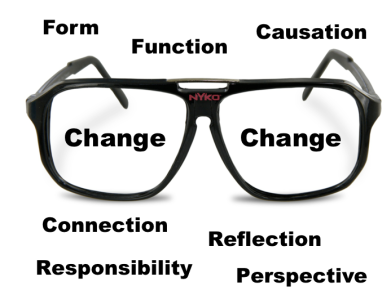‘Hands up if you often forget the things you learn in class.’
‘Hands up if you’re sometimes overwhelmed by information overload.’
Both times, all hands go up, including mine and Jocelyn’s. I’m in her Year 6 class to help them consider the big ideas in their learning and develop their understanding of concepts. This will assist them to organise information in future, explore significant ideas, promote higher order thinking and deepen inquiry.
I show them the avocado model…
They quickly get the idea that the big ideas we remember, long after we have forgotten the details, become the seeds from which new learning grows.
What is a ‘big idea’?
In considering what such ‘big ideas’ might look like, we talk about the fight Ellie had with her brother this morning. Ellie’s incident is specific to time, place and situation, but the children all have similar experiences to share. I ask if they think sibling rivalry exists in other countries and cultures and they say of course. Will it still exist in the future? Definitely. Did it exist long ago in the past? They have examples as far back as Cain and Abel! It is clear then that the ‘big idea’ of sibling rivalry is transferable, timeless and universal.
Once they get the idea, they are quickly able to express the big ideas behind a range of topics they have explored in the past. They’re even able to grasp the Lyn Erickson ‘Structure of Knowledge’ diagram. I tell them I learned this at a workshop for teachers but I’m sure they will get it. I ask for a show of hands if anyone thinks kids are as smart as teachers. Lots of hands, some giggling. They do get it …and they give examples from their own learning.

Yesterday Joc had them look at their class learning community through the lenses of the PYP key concepts.

Today we ask them to reflect on everything they have done in these first few weeks of the school year and extrapolate the ‘big ideas‘. They move into groups to discuss the learning experiences so far and come up with things like: attitudes, community, rights, responsibility, initiative, communication, questioning, democracy, citizenship, decision-making…
My observations:
– Joc has succeeded in building a thoughtful learning community.
– The learners are already on their way to the desired conceptual understandings for their unit:
- Citizenship carries with it a sense of belonging or identity which includes rights and responsibilities, duties and privileges.
- Different decision-making strategies can be effective in different situations.
- In a democracy, citizens have a say in decision-making.
- The impact of decisions can be personal, local, global.
– By the time they visit Canberra for their inquiry into government, they will have plenty of big ideas to which they can connect.
– There’s no reason kids can’t be exposed to the same ideas as adults. Maybe next time they can explore concepts using the Frayer model, as we did at IB workshop leader training training...


Reblogged this on languagesupportuk and commented:
brilliant piece
LikeLike
Great post as always Edna. It got me thinking about all I learned all at teachers’ college back in the very early 80’s. We looked at the work of Bruner, at the ‘Society in View’ program, at Dewey’s work – concept driven learning was the platform upon which we were required to design what was then called ‘units of work’. I went on to teach this to undergraduates years later. Here, in 2013, I am still battling the ‘facts vs concepts’ ‘knowing vs understanding’ ‘content coverage vs big ideas’ as I work around the world. I’m intrigued as to why we STILL, some thirty years on can find it so difficult to work this way when, as you so beautifully articulate, it comes so effortlessly to our kids. (I was reminded of this yesterday as year 3’s shared with me multiple instances of the concept of ‘synthesis’ in their lives. Mind blowing – but so natural.) Maybe the overwhelming quantity of ‘facts’ we now have available to us will mean we will embrace big ideas as a necessity! Ooops. I’m ranting. Will pass this blog on and keep working to maintain our collective focus on the big picture! Kath
LikeLike
I know how you feel Kath. I am currently working through a M.Ed in Maths education, and we read articles from the 60’s that are essentially the same arguments we are having today.
I think academics and policy makers should spend more time in classrooms….
LikeLike
Reblogged this on stuffaliknows and commented:
Fascinating ideas. Any takers for an experiment with FE students?
LikeLike
Alice, again! Thanks for another great post! I hope to use this idea in my classrooms to come!
LikeLike
Reblogged this on all about learning… and commented:
Thanks for posting this, Edna!
LikeLike
I really like The Avocado Story. It’s as eloquent as it is brief. Thank you for posting it. I also really like what you said about citizenship and democracy.
LikeLike
I love the clip and the images (and the post is good too!).
LikeLike